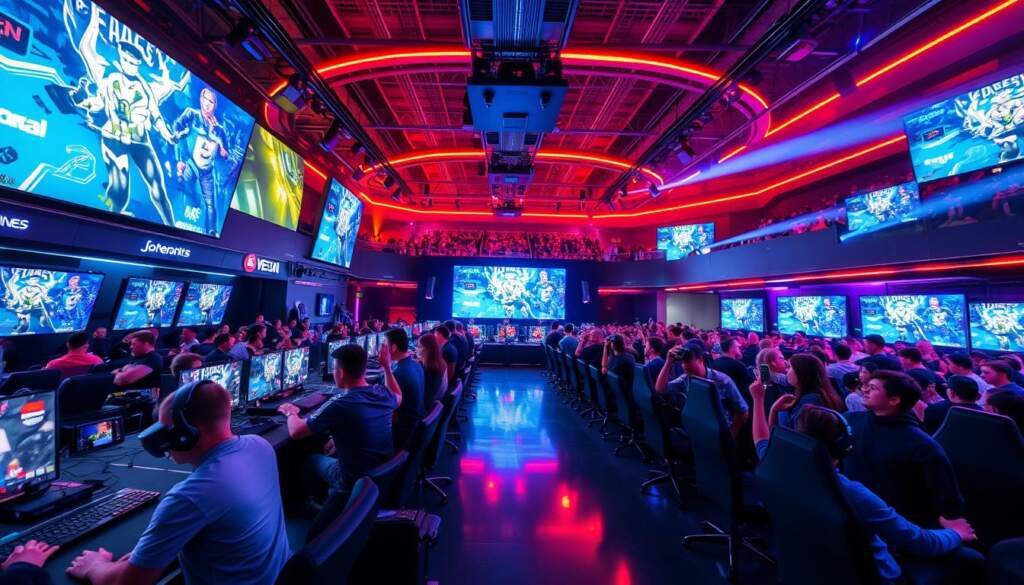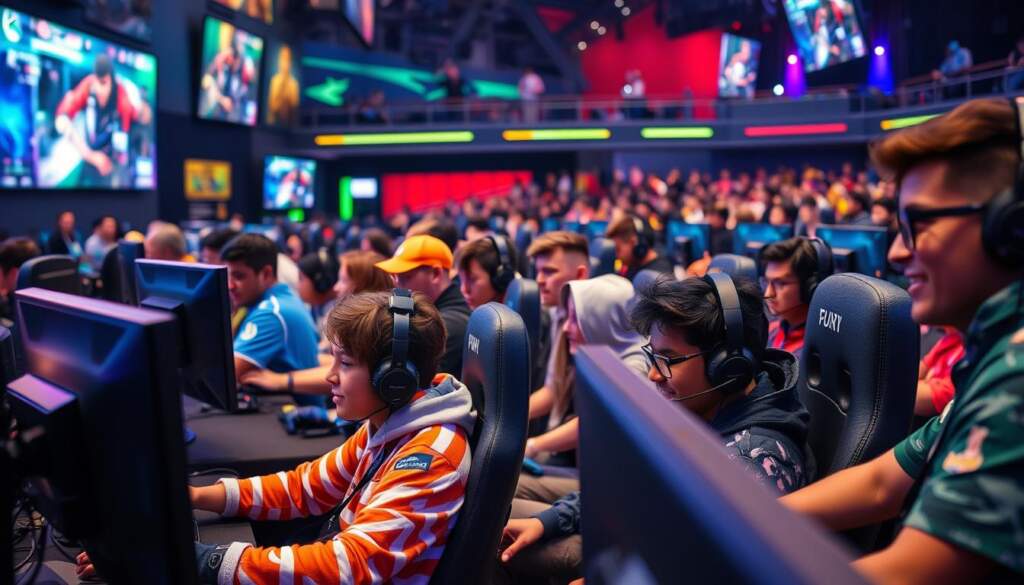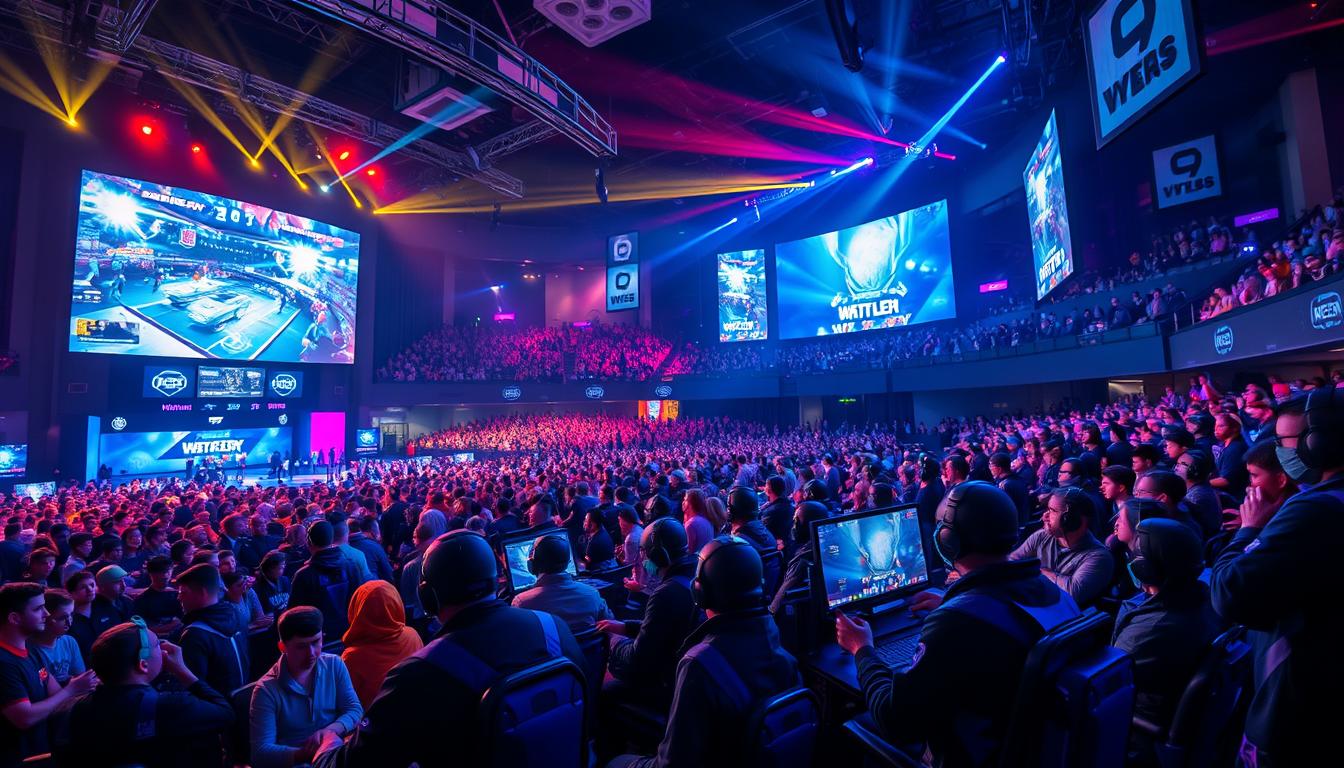The rapid esports evolution is challenging traditional perspectives on athletic competition, firmly positioning competitive gaming at the forefront of future sports trends. Captivating a global audience with its dynamic blend of skill, strategy, and digital prowess, the esports industry growth is not merely a fleeting trend but a potential blueprint for sports in the digital era. As viewership numbers swell, eclipsing even the most watched events like the Super Bowl, esports solidify their claim as not just games, but as a legitimate and burgeoning form of sport.
Advancements in technology and pervasive digital culture have catalyzed the transformation of the esports industry, elevating digital sports to an international spectacle. Once considered a niche hobby, the vibrant competitive gaming sphere now rivals and even surpasses some of the most established sports leagues in viewership and fan engagement1. The global esports audience, including both casual viewers and dedicated enthusiasts, is on a trajectory that may see it break the half-a-billion mark in the near future, with revenues soaring well beyond the billion-dollar threshold2.
Key Takeaways
- Esports are redefining what it means to be a sport in the digital age.
- The esports audience is expanding rapidly with projections to exceed 500 million globally2.
- Its viewership has now outgrown traditional leagues like the MLB and NBA1.
- Revenues have surpassed $1 billion, largely driven by sponsorship and media rights2.
- Competitive gaming offers pathways to education and career opportunities, as seen with extensive scholarship distribution within High School Esports Leagues1.
- The industry’s growth is fostered by key partnerships and scholastic integration.
Exploring the Rapid Growth of Esports Popularity
The global esports market is undergoing a transformation, not only rivalling traditional sports in terms of viewership but often surpassing them. This section delves into the noteworthy trends and statistics that assert esports as a dominant force in sports entertainment.
The Surpassing of Traditional Sports Viewership
Esports viewership has escalated to compete with some of the most-watched global sports events. For instance, major esports tournaments like the League of Legends World Championship garner viewer counts that stand on par with traditional sports’ finals3. Technological advancements have significantly enhanced streaming capabilities, making it easier for a global audience to watch esports competitions from anywhere3.
Audience Statistics: From Millions to Billions
The audience growth in esports is staggering. By 2023, the esports market size reached USD 1.88 billion and is set to climb to USD 2.30 billion, showcasing rapid expansion in interest and investment in the field4. The accessibility of online gaming has also been pivotal in amplifying the popularity of esports, attracting global viewership and participation across various platforms3.
Sponsorship and Revenue Generation in Esports
Esports investment continues to flourish, with revenue avenues expanding through sponsorships and media rights. Top-tier esports events now attract significant sponsorship from renowned brands like Nike, Coca-Cola, and Red Bull, recognizing the substantial streaming audience that these events draw43. Furthermore, the creation of dedicated esports facilities supported by government incentives reflects a serious commitment to fostering the esports ecosystem4.
| Year | Global Esports Market Size (USD Billion) | Viewership Numbers |
|---|---|---|
| 2022 | 1.88 | Significant increase from previous years |
| 2023 | 2.30 | Expected to surpass historical highs |
| 2030 (Projected) | 12.10 | Continual growth with technological advancements |
As the esports industry progresses, it promises not just entertainment but also burgeoning career opportunities and economic impacts4. The melding of technology, audience growth, and robust investments is paving the way for esports to become a monumental facet of modern culture, an evolution highlighted in this insightful feature on sports evolution.
The Role of Technology and Accessibility in Esports
The ascent of esports is deeply intertwined with advancements in esports technology and the expansion of competitive gaming accessibility. These elements have worked in tandem to democratize the world of sports, providing an inclusive platform for emerging talents from diverse backgrounds.
Democratizing Sports Through Online Platforms
Online gaming platforms are at the forefront of breaking the traditional barriers to entry in competitive sports. With internet advancements, platforms now afford opportunities to anyone with a connection. The emergence of cloud gaming and the integration of machine learning for optimizing player matchmaking and experience have significantly contributed to this trend, facilitating a more inclusive environment that embodies the concept of the esports digital divide5.
High-Speed Internet as a Catalyst for Growth
The role of high-speed internet for esports cannot be overstated. It’s not merely about connectivity; it’s about the seamless integration of 5G technology that enhances real-time interactions in international tournaments6. This level of connectivity ensures minimal latency and an optimized competitive environment, a must-have in high-stakes esports competitions.
The Advantage of Digital Infrastructure in Competitions
Advanced digital infrastructure is a game-changer in the realm of competitive gaming. High-refresh-rate monitors and the use of wearable technology have enhanced player performance and spectator interaction during live events57. Accessibility to such technologies not only elevates the experience but also ensures that the playing field is level, a principal factor in competitive fairness.
The integration of streaming technology and professional-grade equipment embodies the technological robustness that supports the esports ecosystem. Broadcasts of gameplay not only reach global audiences but also engage them in ways that traditional sports formats cannot, further driving the popularity and acceptance of esports as a legitimate competitive field57.
| Advancement | Impact on Esports | Future Prospects |
|---|---|---|
| Cloud Gaming | Enables global access to games, removing hardware constraints | Expected to attract more users with convenience and lower start-up costs |
| 5G Technology | Faster, more reliable internet connections for real-time gaming | Enhanced mobile esports experiences with wider reach |
| AI and ML | Optimizes game design and player matchmaking | Potential for personalized gaming experiences and new game formats |


In conclusion, by championing technology and ensuring accessibility, the esports industry is not only bridging divides but is also paving the way for a future where digital and physical sporting spaces coexist. For many, esports has become more than a game; it’s a gateway to innovation and community576.
Esports as an Inclusive and Diverse Community
The esports industry is uniquely positioned to champion diversity in gaming and create an inclusive esports community. Initiatives worldwide are focusing on enhancing accessibility in esports for diverse groups, paving the way for more female gamers and marginalized communities to participate meaningfully in gaming activities.
Significant data illustrate the current landscape and challenges within the industry. Only 5% of professional players in esports are female, despite the fact that nearly 60% of women aged 18-29 regularly engage in video games8. This startling disparity underscores the importance of targeted initiatives to balance the scales in professional esports.
Moreover, the inclusivity efforts extend beyond gender. The “Gaming for Inclusion” project demonstrates a powerful commitment to integrating athletes with impairments, offering everyone a chance to compete and enjoy gaming at a competitive level8. However, challenges persist, such as the reported 73% of LGBTQ+ athletes facing harassment based on their sexual orientation or gender identity in online platforms8.
| Initiative | Focus Area | Impact |
|---|---|---|
| Telekom’s Equal eSports Initiative | Female Representation | First all-female professional team in Germany for League of Legends |
| Gaming for Inclusion | Accessibility | Over 90 Paralympic athletes participated in a virtual tournament |
| AnyKey | General Diversity | Supports diverse participation in esports, fosters an inclusive environment9 |


Diverse approaches and strategic programs are instrumental in shifting traditional perceptions and enhancing the diversity in gaming. By tackling the harsh realities like sexism and harassment, which have kept certain groups on the sidelines, the industry aims to cultivate an environment where every player can thrive based on their skills and passion for gaming.
The implementation of educational initiatives and the integration of diversity into academic projects, as seen in Staffordshire University’s curriculum, are crucial steps towards a more inclusive future10. Such efforts not only prepare the next generation of gamers and developers but also instill respect and understanding for diversity and inclusion within the esports domain.
In conclusion, the pursuit of an inclusive esports community is not just about rectifying numbers but fostering true diversity and equality in gaming experiences. Every initiative taken is a step forward in making esports a beacon of inclusivity and accessibility, setting a precedent for other sectors.
Esports in the Educational and Career Spheres
The exhilarating world of esports has far-reaching impacts beyond the gaming screens, notably infiltrating educational systems and career pathways. This section delves into how esports education, with the backing of robust scholastic esports programs and partnerships within the esports industry, is sculpting futures and crafting real-world opportunities for students and educators alike.
Scholastic Integration: Pathways in Education
Esports has transcended traditional gaming arenas to become a valued educational tool in schools nationwide, promoting higher engagement among students. Participants in these programs tend to exhibit higher GPAs and better attendance rates compared to their non-participating peers11. Schools are increasingly recognizing the value of esports as a catalyst for delivering education in teamwork, strategic thinking, and technological proficiency12. Through esports, students gain the exposure necessary to navigate the complex digital landscapes of the future.
Career Opportunities: Beyond the Professional Athlete
The burgeoning esports market, valued at $1.4 billion as of last year12, is not just nurturing professional gamers but also contributing to a vast demand for diverse career roles within the sector. Opportunities range from game development to sports management and from event coordination to digital content creation. The comprehensive nature of esports programs aids students in developing a potent mix of technical skills and adaptive thinking, requisite traits in the ever-evolving gaming landscape.
Partnerships: Bridging Education and Industry
Substantial growth in esports education owes much to strategic partnerships between educational institutions and leading industry giants. Essences of such collaborations include the integration of real-time gaming technologies into curriculums and the establishment of scholarships and training camps, thus fostering a skilled workforce adept at meeting industry needs. These alliances strengthen the bridge between academic learning and professional realities, significantly enhancing career readiness among students12.
The inclusion of esports in education is creating pathways for the next generation where they learn not just to compete, but also to collaborate, innovate, and lead in high-pressure environments that mirror real-world challenges. As this sector continues to flourish, it promises not only to revolutionize how subjects are taught but how students prepare for a broad spectrum of careers threaded tightly with technological prowess and strategic insight.
Conclusion
The digital sports revolution is rapidly defining the twenty-first century’s competitive landscape with esports reimagining what it means to be an athlete or a spectator. The integration of esports into prestigious events such as the South-East Asian Games and potentially, the Paris 2024 Olympic Games, signal a bright esports outlook where traditional and digital arenas converge13. At the same time, major investments like the acquisition of ESL and FaceIt by a Saudi-backed group point to skyrocketing valuation and seriousness with which the global market views esports’ potential14.
With an inclusive community fostering an environment removed from physical limits, the Olympics esports potential no longer seems like a distant dream, but a forthcoming reality. Statistics support this, illustrating the gradual incorporation of esports into major European Games, as well as pre-Olympic festivities endorsed by prominent Olympic partners such as Intel13. Esports’ future trends are also being shaped by technological advancements like mobile gaming and virtual reality, which are breaking geographical barriers and cultivating physically active esports platforms, as seen through games like HADO and technological developments spearheaded by companies like Sony13.
Our examination also delves into the societal and educational impact of esports. The introduction of dedicated coursework like the esports BTEC qualification in the UK and the reach of mobile gaming into vast new regions evidences esports as a burgeoning pathway not only for entertainment but also for education and career development14. As we look forward to the Tokyo 2020 Olympic Games and beyond, the question is not whether esports will continue to grow, but how the community will maintain its trajectory of inclusivity, utilize technological advancements, and adhere to standardized regulations to ensure fair play across the board13. Embracing this balance will secure esports’ position not just as a contender but as a stalwart in the global sports iconography.
FAQ
What has fueled the esports evolution into a potential future sports trend?
How is the esports industry growth challenging traditional sports viewership?
Can you provide audience statistics that showcase the growth of esports?
What role do sponsorships and revenue generation play in the esports landscape?
How is technology democratizing the accessibility of sports through esports platforms?
Why is high-speed internet a catalyst for growth in the esports industry?
In what ways does digital infrastructure provide advantages in esports competitions?
How does the esports community promote inclusivity and diversity in gaming?
What educational pathways are emerging through scholastic esports integration?
How do career opportunities in esports go beyond being a professional athlete?
What is the significance of partnerships between the education sector and the esports industry?
What does the outlook for esports suggest about the future of the digital sports revolution?
Source Links
- Changing the game: Could esports be the future of athletics? – https://www.ksat.com/news/local/2024/04/02/changing-the-game-could-esports-be-the-future-of-athletics/
- The Future of Esports – https://intenta.digital/esports/future-of-esports/
- Exploring the Rise of Esports Gaming around the World | GameGrin – https://www.gamegrin.com/articles/exploring-the-rise-of-esports-gaming-around-the-world/
- Exploring the Thrilling World of Esports – https://maysalward.com/the-rapid-growth-of-the-esports-industry
- Technology Advancements Impacting Esports Gaming – https://www.ixiegaming.com/blog/technology-advancements-in-esports-gaming/
- How technology is helping eSports – https://www.telefonica.com/en/communication-room/blog/how-technology-is-helping-esports/
- The Rise of the ESPORTS Industry: Competitive Gaming – https://www.ecgprod.com/the-rise-of-the-esports-industry/
- Level up: That’s why gaming needs even more inclusion – https://www.ispo.com/en/news/trends/diversity-esports-why-gaming-needs-even-more-inclusion
- Diversity in esports: The initiatives making esports more inclusive – https://britishesports.org/the-hub/guides/diversity-in-esports-initiatives-making-esports-more-inclusive/
- Diversity and inclusion growing in gaming and esports — here’s why – https://www.businessandindustry.co.uk/video-games-esports/diversity-and-inclusion-growing-in-gaming-and-esports-heres-why/
- Why Esports is the Future of Education: The Importance of Having an Esports Program in Every School – Part 1 – https://www.linkedin.com/pulse/why-esports-future-education-importance-having-program-stephen-sye
- Esports and Gaming: similar yet distinct. Uncover the educational opportunities they offer. Ready to explore esports education? Get a demo! – https://gameplan.com/news/esports-and-gaming-what-is-the-difference
- Esports is the future of all sports – here’s why – https://theconversation.com/esports-is-the-future-of-all-sports-heres-why-121335
- The Future of Esports: Challenges and Opportunities – https://medium.com/@fasihahmad44/the-future-of-esports-challenges-and-opportunities-a8391f69bc14



